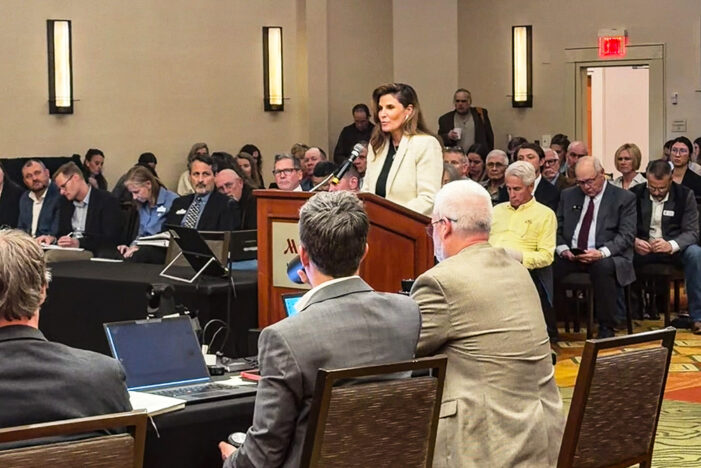
Western Colorado elected officials celebrated what they called a historic show of unity this week after the Colorado Water Conservation Board voted unanimously to advance an agreement that would permanently protect the Shoshone water rights for the benefit of the Western Slope.
The vote clears the way for the Colorado River District to take the final step of securing the rights in Colorado water court.
According to City Council member Anna Stout, who called into Wednesday night’s regular Grand Junction City Council meeting from the hearing in Golden, the Western Slope delegation had been in deliberations since early afternoon. Stout said communities throughout the region, including Grand Junction, Glenwood Springs and Mesa County, worked together for several years to support the acquisition and the long-term protection of river flows.
“The City of Grand Junction is participating in the acquisition to the tune of a million dollars,” Stout told the council. “Communities throughout the Western Slope have all given significant commitment. Glenwood Springs gave 2 million. Grand Junction was also one of the first in with official support.”
According to Stout, the Colorado River District and Public Service Company of Colorado negotiated the agreement that would allow the Shoshone water rights, which date to 1902, to be converted to permanent instream-flow protection when the hydropower plant is not operating.
Stout said the Colorado Water Conservation Board was determining whether “the acquisition is appropriate to preserve and improve the natural environment” and whether the proposed instream-flow use met the same standard. She said the board was “poised to make a favorable determination.”
Minutes later, Stout called back to confirm the vote had passed, adding the room was filled with tears and joy when the vote became official.
Collaborative Western Slope effort
Council Member Stout also said Mesa County Commissioner Bobbie Daniel was in attendance at the Colorado Water Conservation Board meeting representing Mesa County. Daniel, who testified at the meeting later, wrote in a statement on her Facebook page on Nov. 19 that the vote was “a historic day for Colorado and for the Western Slope,” adding the result was possible because “the region stood united.”
Colorado River District General Manager Andy Mueller told the Colorado Water Conservation Board during the meeting that the Shoshone agreement was “one of the biggest moments in Colorado River history in our state.”
What does and doesn’t change?
The Colorado River District’s technical summary, included in the public-acquisition documents for the meeting, states the purpose of the agreement is to “preserve the historic operation of the Shoshone call” and to ensure the river continues to operate as it has for decades when the hydropower plant is offline. The summary also notes the agreement “formalizes long-standing cooperative practice” that has been maintained through temporary contracts.
The Colorado Water Conservation Board’s staff presentation contained in the Nov. 19 meeting packet states that Xcel Energy will continue diverting water for hydropower when the plant is operating. Staff explained that when the plant is not operating, the right will convert to instream-flow use under CWCB authority.
Colorado Parks and Wildlife, in its official written submission to the Colorado Water Conservation Board, concluded the proposed instream-flow right “will preserve and improve aquatic habitat conditions” and supported the environmental findings required for approval.
What was at risk if agreement failed?
If the right had remained solely in Xcel Energy’s hands, it would have continued to be subject to sale or change of use and could have been purchased by Front Range interests. The Colorado River District’s acquisition documents state that without water-court approval, Xcel Energy would continue to own the Shoshone water right, which could be changed, sold or repurposed under Colorado water law.
The Colorado Water Conservation Board staff warned in the Nov. 19 meeting packet that “the existing operating agreements are sunsets with no long-term guarantee and may be terminated by mutual consent or changed unilaterally if the permanent conversion is not approved.”
The Colorado River District’s technical summary stated that “without entry of the final decree the Western Slope loses its only defensible mechanism for maintaining the senior 1902 Shoshone call in the river, exposing irrigation, municipal supply and recreation flows to diversion risk.”
Mesa County was adamant that joint management was part of the deal.
“If joint management is not adopted, Mesa County will withdraw its support for this acquisition. It’s not out of anger or politics, but because anything less would fail the people that we serve.” Daniel said, in “State says ‘yes’ to Western Slope’s plan for Shoshone water rights” (The Colorado Sun, Nov. 20, 2025).
Joint management ensures the Western Slope has a formal voice in how the Shoshone water right is administered.
The draft stipulation filed with the Colorado Department of Natural Resources states, “The State of Colorado through the Colorado Water Conservation Board and the Colorado River District shall be co-applicants for the change of the Shoshone water right to instream flow use, and shall jointly administer the instream flow water right in the Shoshone Reach in accordance with this stipulation.”
Duration of the agreement
According to the acquisition stipulation filed by the Colorado River District and the Colorado Water Conservation Board with the Colorado Department of Natural Resources, “The instream flow protection shall be perpetual upon entry of a final decree.”
The stipulation also says the parties must “diligently pursue approval in water court” until the decree is final and unappealable.

